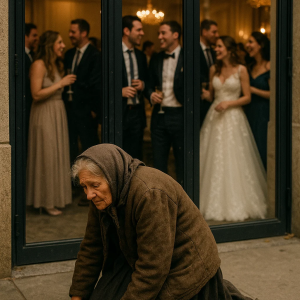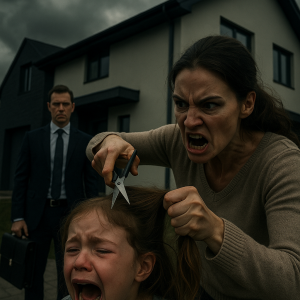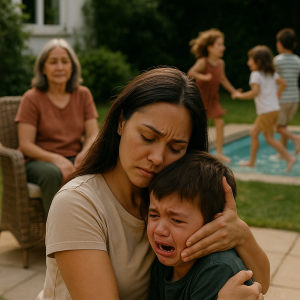The Boy Who Fell Silent After the Sirens — And the First Word He Spoke Left Everyone in Tears
Michael hadn’t spoken since the sirens came.
Not a whisper. Not a cry. Not even the quiet humming he once carried with him everywhere.
The boy who had begged for bedtime stories, who clutched his father’s hand at the grocery store, who once filled the house with questions about everything from trains to stars—fell into silence the morning the flashing red and blue lights stopped at their door and refused to leave.
Michael was only four.
The world said he still had a voice. The doctors, the therapists, the specialists—each one insisted it was there, locked inside him. But grief had swallowed it whole.
A House Drenched in Quiet
Clara, his mother, tried everything. She read books on selective mutism, joined online forums for grieving families, sat with specialists who promised breakthroughs.
His teachers practiced patience. They wrote notes on whiteboards, drew pictures, and offered gentle smiles when Michael answered with shrugs instead of words.
Neighbors whispered.
“Poor boy.”
“That silence isn’t natural.”
“He’ll grow out of it, you’ll see.”
But nights were the hardest. Clara would kneel by his bed, tuck in the blue Christmas sweater he insisted on wearing even in spring, and whisper, “Say goodnight, sweetheart. Just one word. Please.”
Nothing came back. Only wide eyes, unblinking, staring into the shadows.
Grandma Mary
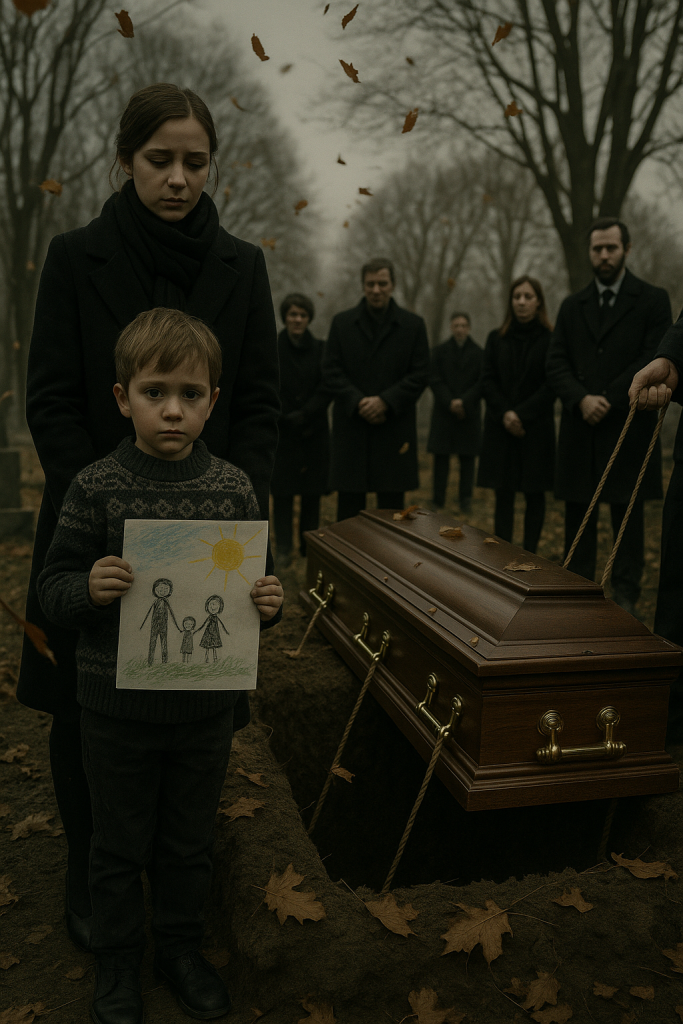
There was only one person who never begged for words: Grandma Mary.
Every day, she showed up. Sometimes with ginger cookies wrapped in wax paper. Sometimes with old photographs of Clara as a girl. Sometimes with nothing at all but her voice—steady, warm, and endlessly patient.
She told stories of her childhood on the farm, of winters when the snow buried the barn roof, of summers when she chased fireflies barefoot through the fields.
And when Michael sat on the floor with his teddy bear and said nothing, she didn’t press.
“Words will return,” she would say, brushing the hair gently from his forehead. “When your heart is ready.”
Clara often watched from the doorway, her chest aching. Something in her mother’s calm seemed to reach Michael in ways nothing else could.
The Missing Visit
Then, one Tuesday in late November, Grandma Mary didn’t come.
Clara tried to hide her panic, but by evening her phone was buzzing nonstop. Calls from her brother. A message from the hospital.
And then the words she dreaded most:
“Your mother passed in her sleep. Peaceful. No pain.”
Clara sat at the kitchen table, the world tilting around her. She didn’t know how to tell Michael. Didn’t know if he could even understand.
But that evening, as Michael sat by the window in his blue sweater, staring into the dusky street, something shifted in the air. The silence in the house—once soft, like a heavy blanket—suddenly felt hollow. Empty.
For the first time in years, Clara wished her son’s silence would break. She needed his voice. She needed proof that life hadn’t stolen everything.
Oakwood Cemetery
The funeral came two days later. The sky was a flat, oppressive grey, clouds heavy with unfallen rain.
Clara stood with Michael at Oakwood Cemetery as neighbors, cousins, and old church friends circled around the open grave.
Michael clutched his teddy bear tightly, his little hands white at the knuckles. He said nothing as the priest spoke, nothing as the casket was lowered, nothing as Clara sobbed into her brother’s shoulder.
Everyone expected silence.
Everyone assumed the boy who hadn’t spoken since the sirens came would remain mute even now.
But they were wrong.
The First Word
It happened just as the priest closed his Bible. The mourners bowed their heads, and the wind picked up, tugging at jackets and scarves.
And then, clear as a bell, Michael’s lips parted.
One small word slipped out, soft but steady.
“Goodbye.”
The crowd froze. Heads snapped up. Clara nearly dropped to her knees.
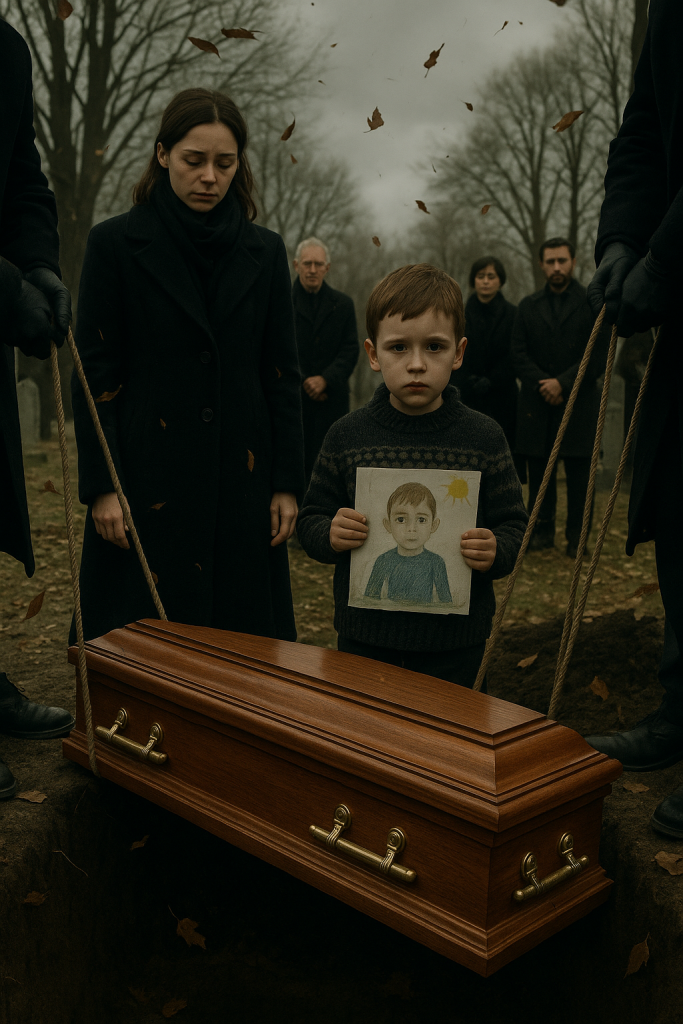
Tears streaked down her face as she pulled him into her arms. “You spoke,” she whispered. “Oh, sweetheart, you spoke.”
But Michael wasn’t finished.
He looked at the grave, then at Clara, and added a second word. One that made the entire crowd go cold.
“Soon.”
Whispers in the Dark
That night, Clara couldn’t sleep.
She replayed it over and over—the clarity of his voice, the haunting way he had said it, the fact that his first words in years weren’t about her, or home, or love… but a chilling farewell.
“Goodbye. Soon.”
What did he mean?
Was it just grief? A child’s way of processing death? Or was there something else? Something he’d seen? Something he knew but couldn’t express until that moment?
Neighbors whispered again. Some said the boy had inherited “the sight.” Others muttered that children often carried truths adults could no longer hear.
The Return of Words
Over the weeks that followed, Michael began to speak again—slowly at first, then in bursts. Simple words. Short sentences. His therapists called it a breakthrough. Clara called it a miracle.
But something was off.
Michael didn’t speak like other children. He didn’t chatter about toys or cartoons or playground games. His words were heavy. Measured. Sometimes frightening.
One night, as Clara tucked him in, he whispered, “Grandma visits me in dreams. She says she’s not alone.”
Another morning, at breakfast, he pushed away his cereal and said, “The sirens will come back. Not for me this time. For you.”
Clara’s blood ran cold.
The Letter
Two months later, while cleaning out her mother’s house, Clara found a sealed envelope tucked inside Mary’s recipe book. The handwriting was her mother’s.
It read:
“Clara, if you’re reading this, it means I’ve gone on. Please don’t be afraid. Michael is special. He sees things we don’t. Don’t silence him. Don’t fear him. He’ll guide you when the time comes. Trust him.”
Clara folded the letter with trembling hands. She wanted to believe it was just a grandmother’s attempt at comfort. But deep down, she knew Mary had always sensed something about Michael.
It was late March when the sirens returned.
Clara was cooking dinner when she heard them—distant at first, then swelling louder. Flashing lights filled the street, just like that morning years ago.
Her heart raced. Not again. Please, not again.
She ran to the living room, where Michael stood at the window in his blue sweater, teddy bear in hand. His face was calm. Too calm.
He turned to her, eyes steady, voice clear.
“It’s time, Mommy. Don’t be scared.”
Seconds later, a knock rattled the front door.
Clara’s knees weakened. She didn’t move. Didn’t breathe.
The sirens wailed outside.
Michael reached for her hand. For the first time in years, he clung to her—not in silence, but in words that chilled her to the core.
“I told you. Goodbye. Soon.”
The Ending That Haunts
What happened next, the town still debates. Some say the knock on the door was just police delivering news about a neighborhood fire. Others whisper it was something darker—that Michael knew, long before anyone else, that grief was about to strike again.
But one thing is certain: his silence had never been empty. It had been waiting. Watching. Listening.
And when his words returned, they weren’t the babble of a child. They were warnings. Prophecies. Echoes of something beyond the living.
So the question remains—
Did Michael’s silence hide trauma, or was it something deeper? Did Grandma Mary pass down more than love and ginger cookies?
And the one that chills every parent who hears this story:
👉 If your child whispered a warning that echoed through your bones… would you believe them?

